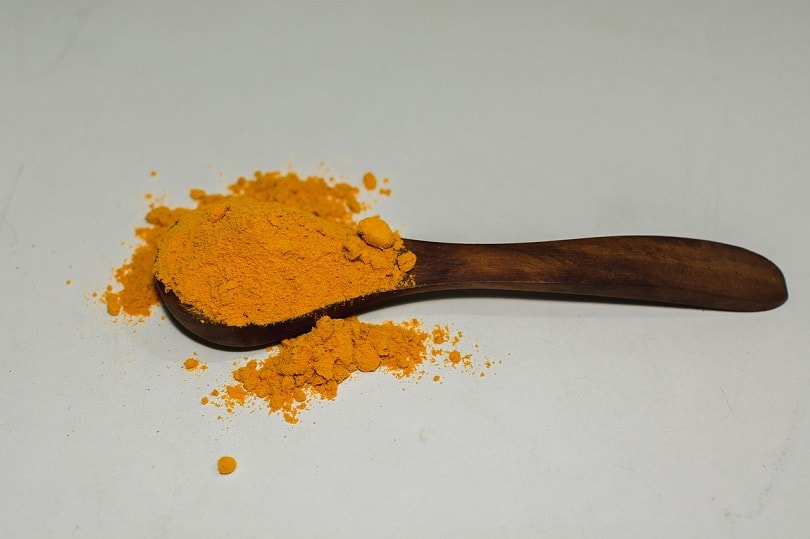Turmeric is a root that is related to ginger, and its scientific name is Curcuma longa. Turmeric has been appreciated in traditional medicine for centuries, as it is known to have many benefits for people and their animals, including dogs. Turmeric contains curcumin and is considered an antioxidant and anti-inflammatory, which may help your dog with a variety of different health problems. Turmeric has not been heavily studied, though, especially in dogs. For this reason, most of what we know about turmeric is anecdotal in nature – not actually scientific.
There’s some difficulty when it comes to feeding your dog turmeric, though. Most dogs won’t eat if it is directly added to their food, though some may not care enough and will gobble it up anyway. Instead, you may want to consider making a turmeric-specific recipe, which will give your dog the benefit of turmeric without the difficulty of trying to get them to eat it.
In this article, we will look at several turmeric recipes for your canine.

The 4 Turmeric Recipes for Dogs
1. Easy Turmeric Paste

Easy Turmeric Paste
Equipment
- Saucepan
- Spoon
- Jar
Ingredients
- ½ cup organic turmeric powder
- 1½ cup water
- 1½ tsp organic black pepper
- ¼ cup ghee clarified butter
- 1 tablespoon cinnamon some dogs prefer the taste with cinnamon
- ¼ cup ground ginger optional
Instructions
- Mix the turmeric with the water and heat them in a pan. A thick paste should form after 7 to 10 minutes. Add more water if the paste gets too thick.
- Once the turmeric/water mixture has thickened into a paste, add the pepper, cinnamon, ghee, and ginger (if using).
- Let the mixture cool.
- Place it in a jar and store it in the fridge. It will last for at least 2 weeks.
Notes
Many recipes will tell you to use coconut oil. However, this is not the healthiest option for our canines. Instead, we recommend using ghee, as it contains more omega 3s. Image Credit; karl-solano, Pexels
2. Turmeric Pup Gummies

In a small saucepan, add 2 cups of homemade, dog-safe bone broth or chicken stock prepared without onion or garlic. One by one, add 6 tablespoons of unflavored gelatin powder. The secret is to let it hydrate gradually. Mix 3 tablespoons of freshly grated organic turmeric root or organic turmeric powder and a pinch of ground organic black pepper.
Mix until well blended, then warm on the stove on low heat and stir it for a few minutes until the gelatin is fully dissolved. When the gelatin is liquid and the ingredients are well blended, carefully spoon them into small silicone molds. Allow them to cool down before bringing them to the fridge for 4-6 hours until set.
3. Turmeric Toothpaste

Turmeric toothpaste is a tasty way to keep your dog’s teeth clean. The recipe is quite simple if you’ve made the above paste.
All you need to do is add a bit of extra ghee to the paste to make it more “toothpaste-y.” This can be used to brush your dog’s teeth. They may enjoy it more than usual toothpaste if they like the flavor, though some dogs will find it quite nasty and may avoid it.
Turmeric toothpaste has been historically used in indigenous medicine. The mechanical action of the turmeric granules is the main responsible for removing dental plaque. More research is needed to conclude if the medicinal properties of turmeric play a role. We mention this consideration because we want you to know that we do not recommend completely replacing your dog’s regular tooth brushing with enzymatic toothpaste. If your dog has other dental problems, this toothpaste may not be indicated for them. Speak with a vet before using this toothpaste, just in case.
4. Turmeric Milk

We recommend using turmeric paste over “golden milk” simply because it is better for your dog. However, some dogs refuse to eat turmeric paste no matter how well you hide it. In these circumstances, it is often necessary to use turmeric milk instead. This may be a good alternative to the added honey that many recipes use in the paste, as it doesn’t contain quite as much sugar.
Making turmeric milk is quite simple. Simply add some turmeric powder and a pinch of black pepper to goat’s milk. Do not use cow’s milk, as this can upset your pet’s stomach. You can find goat’s milk at your local pet store that is designed for dogs. Alternatively, use goat milk from your local grocery store. Both varieties are perfectly acceptable. Please keep in mind that many dogs are lactose intolerant and this might not be the best choice for them.

Is Turmeric Safe for Dogs?
Yes, in moderation. You should not feed your dog turmeric if they have thin blood or are on blood thinners, as turmeric could cause the blood to thin even more.
What Is the Correct Turmeric Dosage for Dogs?
This is not a straightforward answer because the active ingredient of turmeric, curcumin, is present in different quantities in individual plants. The only way of knowing exactly how much curcumin you are offering to your dog is by providing it in a supplement or capsule form.
How much turmeric to use also varies a lot from dog to dog and depends on the benefits you’re attempting to reach. A study performed on 6-month-old Beagles concluded that 30 milligrams of curcumin per dog per day had a mild anti-inflammatory effect and that curcumin stimulates the antioxidant system and reduces oxidative reactions, positively affecting the dog’s health.
Your best bet would be to work with a vet to determine how much and what kind of turmeric to offer to your dog.
If you need to speak with a vet but can't get to one, head over to PangoVet. It's our online service where you can talk to a vet online and get the personalized advice you need for your pet — all at an affordable price!
Can I Give My Dog Turmeric Paste?
Turmeric is safe for dogs, and it is often added to dog food recipes and formulas. We recommend purchasing organic turmeric from a reliable source. You can safely add it to your dog’s food, but we recommend starting with smaller quantities or those recommended by a vet according to your dog’s size and needs.
Does Turmeric Have Side Effects?
Though herbal remedies are often considered safe, they can cause side effects. Too much turmeric can thin the blood and may interfere with blood thinners. Therefore, it’s not recommended for dogs that are currently taking blood thinners or have other blood problems.
It can also affect clotting disorders, as it thins the blood and makes it more difficult for it to clot properly. You also shouldn’t give it to your dog if they are about to undergo surgery, as it may cause complications.
In Conclusion
Turmeric is thought to have many health benefits, though these have not been studied extensively in dogs. Giving dogs turmeric could be challenging only if they are picky eaters, but most dogs would not refuse to eat food or treats that contain turmeric. Luckily, there are several recipes you can try!
Adding things like honey or clarified butter is often enough to encourage some dogs to eat it. However, you do need to be careful about adding too much sugar, or fat as any excess though, as this can have more negative than positive consequences for your pet.
Most dogs will happily eat turmeric if it is mixed in with wet food that contains plenty of gravy. You can also add it to goat milk, which is quite healthy for some canines.
See also:
- Can Dogs Eat Tomatoes? Are Tomatoes Safe For Dogs?
- Manganese for Dogs: Benefits, Uses & Side Effects
Featured Image Credit: tarapong srichaiyos, Shutterstock























2 Responses
thank you for good information.
Hello Monika,
thank you for lovely feedback! We are glad that you found our article helpful and we hope your dog will love the recipe that you will cook for them.
Have a great day!